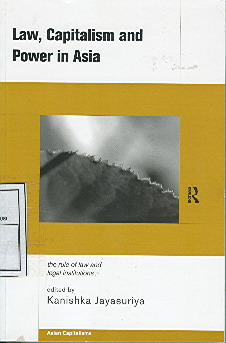
| Judul | Law, Capitalism and Power in Asia 07584 |
| Pengarang | Law Capitalism |
| Penerbitan | New York Sinar Grafika 1999 |
| Deskripsi Fisik | xiii, 345p.; |
| ISBN | 0-415-19743-0 |
| Subjek | 1. Rule of Law-East asia 2. Rule of Law-Southeast Asia 3. Capitalism-East Asia |
| Abstrak | Many governments in East Asia claim that the rule of law is a distinctive characteristic of their political system. Major multilateral agencies such as the World Bank and the Asian Development Bank spend considerable resources in the provision of legal reform projects. There is an assumption that the rule of law will result in a transition to market-based economies and even democracy, but is this really true for Asia? In this challenging and provocative new study the authors contest that the liberal notion of the rule of law regulating the exercise of power is unlikely to come about in much of East Asia. Indeed, they argue that the rule of law is more likely to provide political elites with the means to control civil society more closley. In this broad ranging volume, a comparative approach is used to examine the major states of East Asia and civil and common law jurisdiction. The book makes clear that the rule of law needs to be understood in the context of notions of political authority and shows how important it is to locate conceptions of judicial independence and the rule of law more generally within the ideological vocabulary of the state. |
| Bahasa | Inggris |
| Bentuk Karya | Tidak ada kode yang sesuai |
| Target Pembaca | Tidak ada kode yang sesuai |
| No Barcode | No. Panggil | Akses | Lokasi | Ketersediaan |
|---|
| Tag | Ind1 | Ind2 | Isi |
| 001 | INLIS000000000004327 | ||
| 005 | 20200508202654 | ||
| 008 | 200508||||||||| | ||| |||| ||eng|| | ||
| 020 | $a 0-415-19743-0 | ||
| 035 | 0010-0520004327 | ||
| 041 | $a eng | ||
| 082 | 0 | $a 340.092 | |
| 084 | $a 340.092/XXX/L | ||
| 100 | 0 | $a Law Capitalism | |
| 245 | 0 | 0 | $a Law, Capitalism and Power in Asia 07584 |
| 260 | $a New York $b Sinar Grafika $c 1999 | ||
| 300 | $a xiii, 345p.; | ||
| 520 | $a Many governments in East Asia claim that the rule of law is a distinctive characteristic of their political system. Major multilateral agencies such as the World Bank and the Asian Development Bank spend considerable resources in the provision of legal reform projects. There is an assumption that the rule of law will result in a transition to market-based economies and even democracy, but is this really true for Asia? In this challenging and provocative new study the authors contest that the liberal notion of the rule of law regulating the exercise of power is unlikely to come about in much of East Asia. Indeed, they argue that the rule of law is more likely to provide political elites with the means to control civil society more closley. In this broad ranging volume, a comparative approach is used to examine the major states of East Asia and civil and common law jurisdiction. The book makes clear that the rule of law needs to be understood in the context of notions of political authority and shows how important it is to locate conceptions of judicial independence and the rule of law more generally within the ideological vocabulary of the state. | ||
| 650 | 0 | $a 1. Rule of Law-East asia | |
| 650 | 0 | $a 2. Rule of Law-Southeast Asia | |
| 650 | 0 | $a 3. Capitalism-East Asia |
Content Unduh katalog
Karya Terkait :